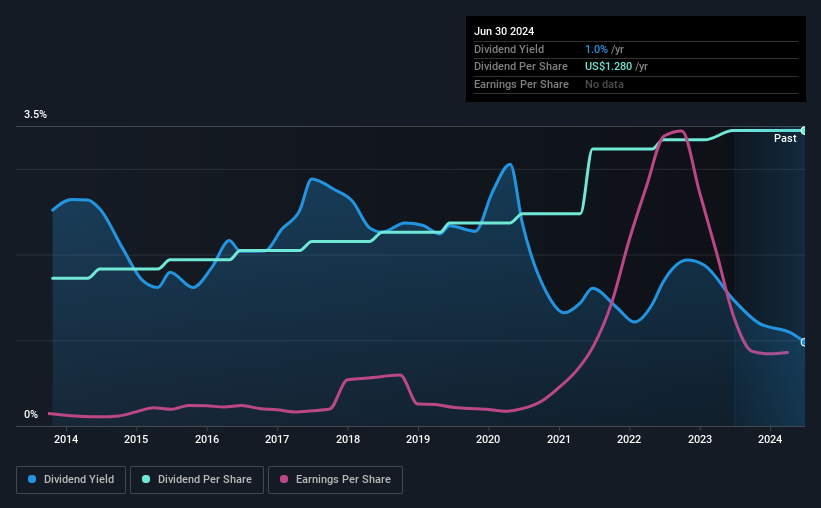Matson's (NYSE:MATX) Shareholders Will Receive A Bigger Dividend Than Last Year
Matson, Inc. (NYSE:MATX) has announced that it will be increasing its periodic dividend on the 5th of September to $0.34, which will be 6.3% higher than last year's comparable payment amount of $0.32. Although the dividend is now higher, the yield is only 1.0%, which is below the industry average.
See our latest analysis for Matson
Matson's Dividend Is Well Covered By Earnings
While yield is important, another factor to consider about a company's dividend is whether the current payout levels are feasible. Before making this announcement, Matson was easily earning enough to cover the dividend. This means that most of what the business earns is being used to help it grow.
Over the next year, EPS is forecast to fall by 3.9%. If the dividend continues along recent trends, we estimate the payout ratio could be 17%, which we consider to be quite comfortable, with most of the company's earnings left over to grow the business in the future.
Matson Has A Solid Track Record
The company has been paying a dividend for a long time, and it has been quite stable which gives us confidence in the future dividend potential. Since 2014, the dividend has gone from $0.64 total annually to $1.28. This implies that the company grew its distributions at a yearly rate of about 7.2% over that duration. Companies like this can be very valuable over the long term, if the decent rate of growth can be maintained.
The Dividend Looks Likely To Grow
Some investors will be chomping at the bit to buy some of the company's stock based on its dividend history. Matson has seen EPS rising for the last five years, at 28% per annum. A low payout ratio gives the company a lot of flexibility, and growing earnings also make it very easy for it to grow the dividend.
We Really Like Matson's Dividend
In summary, it is always positive to see the dividend being increased, and we are particularly pleased with its overall sustainability. The company is generating plenty of cash, and the earnings also quite easily cover the distributions. We should point out that the earnings are expected to fall over the next 12 months, which won't be a problem if this doesn't become a trend, but could cause some turbulence in the next year. Taking this all into consideration, this looks like it could be a good dividend opportunity.
Companies possessing a stable dividend policy will likely enjoy greater investor interest than those suffering from a more inconsistent approach. Still, investors need to consider a host of other factors, apart from dividend payments, when analysing a company. To that end, Matson has 3 warning signs (and 1 which is a bit concerning) we think you should know about. Looking for more high-yielding dividend ideas? Try our collection of strong dividend payers.
Have feedback on this article? Concerned about the content? Get in touch with us directly. Alternatively, email editorial-team (at) simplywallst.com.
This article by Simply Wall St is general in nature. We provide commentary based on historical data and analyst forecasts only using an unbiased methodology and our articles are not intended to be financial advice. It does not constitute a recommendation to buy or sell any stock, and does not take account of your objectives, or your financial situation. We aim to bring you long-term focused analysis driven by fundamental data. Note that our analysis may not factor in the latest price-sensitive company announcements or qualitative material. Simply Wall St has no position in any stocks mentioned.
Have feedback on this article? Concerned about the content? Get in touch with us directly. Alternatively, email editorial-team@simplywallst.com

 Yahoo Finance
Yahoo Finance 
